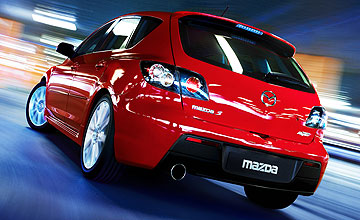BY THE GOAUTO TEAM | 12th Jan 2007

Priced from $39,990, the five-door hatchback produces 25kW more power than the $35,990 Ford Focus XR5 Turbo and $37,990 Renault Megane Phase II RS, to easily steal the kiloWatt crown in the class.
Using a variation of the 2.3-litre twin-cam 16-valve turbo-charged four-cylinder MZR direct-injection (DISI) engine also found in the all-wheel drive Mazda6 MPS sedan (as well as the upcoming CX-7 SUV), power is rated at 190kW at 5500rpm while the 380Nm torque output tops out at 3000rpm.
It runs a compression ratio of 9.5:1.
Drive is channelled to the front wheels only, via a six-speed manual gearbox. Like its Focus XR5 Turbo cousin, no automatic gearbox is available.
The Australian ADR 81/01 fuel cycle average is 10 litres per 100km, while the 0-100km/h-sprint time takes 6.1 seconds – the swiftest of all current Mazda models.
Aiding this is the engine’s electronic throttle and electronic boost pressure control devices, which Mazda says minimise turbo lag.
95 RON premium unleaded fuel is injected under 115-bar pressure directly into the combustion chamber for a 10 per cent torque increase over a more conventional manifold injection engine.
Mazda’s own figures show that – in third gear – the MPS zips from 50 to 100km/h in 4.2 seconds.
The body, suspension and brakes have been significantly uprated to accommodate the MPS’ extra performance over the Mazda3’s more sedate 115kW/203Nm 2.3-litre SP23 sibling.
Look for 20mm-wider front mudguards to help house the 10-spoke ally wheels shod with 215/45 R18 tyres, along with a larger air intake, a bulbous new bonnet pressing, a rear roof spoiler, wider tail pipes (forming part of an exhaust that is tuned to sound ‘sporty’), side skirts, revised rear bumper and a unique hue among the four colour choices – ‘MPS Cosmic Blue’.
To reduce torque steer and other unruly front wheel scrabbling, a boost pressure control has been fitted, that suppresses sudden torque peaks for smoother delivery, along with a limited-slip differential.
A similar goal is reached by a reduction of torque flow in first and second gear, particularly in acceleration from standstill or in tight cornering situations.
Matching the stiffness and matching the angles of the drive shafts further help reduce this.
An increase in torsional rigidity results due to a beefier floor tunnel section, while reinforcements to the front cowl member ups overall body rigidity.
The latter is said to have the same effect as fitting MacPherson strut-tower braces but without the possible deformation and skewing of the suspension geometry.
Similarly, for the rear multi-link suspension set-up, a gusset at the lower part of the towers keeps them steadier.
To counteract body roll higher coil spring rates, fatter anti-roll bars front and rear, and firmer dampers have been fitted.
Stopping power is improved over the regular Mazda3 courtesy of large-diameter four-wheel disc brakes – measuring 320mm for the front ventilated discs and 280mm for the solid rear units – aided by anti-lock brakes, electronic brake-force distribution and emergency-brake assist.
Further on safety, stability control is a standard fitment (and can be switched off), along with traction control, six airbags, a collapsible brake pedal set-up, a revised steering column structure designed to lessen injury to the driver’s lower leg area, while a five-seat seatbelt reminder system has been incorporated.
Aluminium pedals, brushed-metallic look trim, bolstered seating, a 280km/h-calibrated speedometer, red stitching and new striping mark the MPS’ cabin treatment.
Cruise control, climate control air-conditioning, 18-inch alloy wheels, six-stack CD/MP3 audio with satellite controls, power windows and mirrors and front fog lights are also included.
The $43,690 Sports Pack adds a Bose sound system, Xenon headlights, ‘half’ leather trim and high-gloss alloy wheels, as well as 12kg to the standard MPS’ 1403kg kerb weight.
Mazda is forecasting 130 MPS sales every month, with the Sport Pack accounting for around 30 per cent of total volume.
The Mazda3 MPS may be the newest member of a growing number of high-performance small cars, but it already one of the fastest production front-wheel drive cars on the planet. Top speed is limited to 250km/h. No specific maximum-velocity figures are provided.
Recent inductees to the hot-hatch ranks include the 165kW/320Nm Focus XR5 Turbo, 147kW/262Nm Holden Astra SRi Turbo and 130kW/202Nm Citroen C4 VTS.
An HSV Astra VXR version will arrive by the end of the year, but it will ‘only’ deliver 176kW and 320Nm. Volkswagen’s Golf GTI produces 147kW and 280Nm.
The Mazda3 MPS isn’t the first turbocharged Mazda small car to be sold in Australia.
From 1987 to 1989 it offered the BF-series 323 SS Turbo and Turbo 4WD tearaways, as an adjunct to the regular SS ‘warm’ hatchback models.
Both were fitted with a 1.6-litre twin-cam 16-valve B6T four-cylinder engine developing around 110kW and 187Nm, and tied to a five-speed manual gearbox.
Ford also offered the same mechanical set-up in the 323’s 1987 to 1990 KE Laser TX3 and TX3 Turbo 4WD ‘Bubbleback’ fraternal twins.